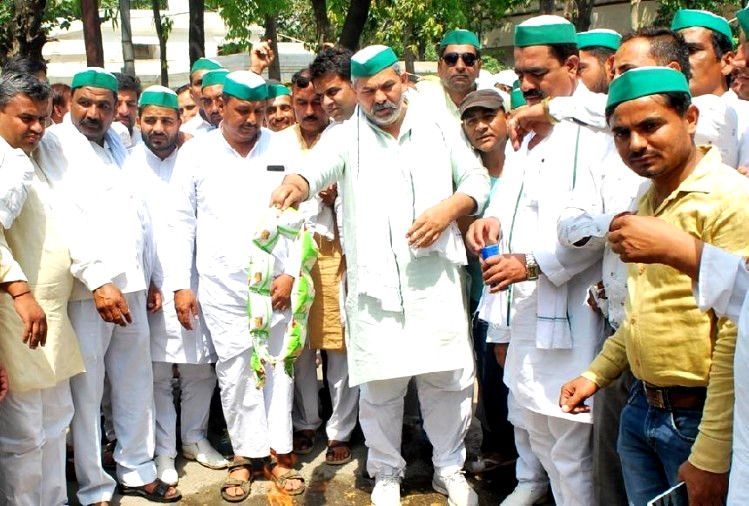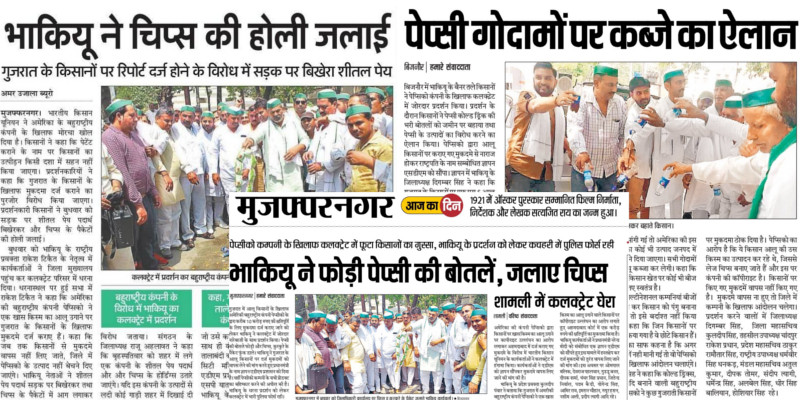PepsiCo faces major backlash in India, as farmers fight back

09 May 2019: PepsiCo India Holdings Private Limited (PIH), Indian subsidiary of the global giant Pepsico had sued Gujarat-based farmers for growing a hybrid potato variant — FL 2027 aka FC5 — which the firm claims to have exclusive rights to, by virtue of a Plant Variety Certificate they acquired.
Live Law reported that In the commercial trademark suit filed in Ahmedabad City Commercial Court against the farmers, PepsiCo India Holdings Ltd has claimed that in 2016 it obtained registration under The Protection of Plant Varieties and Protection of Farmers Rights Act 2001 to breed a special variety of potato, which is used in making “Lays” chips.
It is also being reported that in their bid to ‘gather evidence’ against these farmers, the firm had allegedly employed a private intelligence agency to collect samples from the farmers’ fields, offering a striking resemblance to the surveillance tactics used by Monsanto against Canadian farmer Percy Schmeiser in 1998.
Protests ensued across India.
Among them, the agitation organised by Bhartiya Kisan Union on 1st of May witnessed hundreds of farmers gathering at the Muzzafarnagar collectorate and protesting against the lawsuit.

“Farmers have a right to produce any crop which benefits them. In Gujarat, PepsiCo filed cases against potatoes farmers which is totally wrong and illegal.” , said Rakesh Tikait, National spokesperson of Bhartiya Kisan Union.
During the agitation in Bijnor, farmers brought bottles of soft drink and emptied its contents as a mark of protest. They handed over a memorandum to district magistrate, Sujeet Kumar while addressing it to the President of India. They demanded withdrawal of cases lodged against potato farmers in Gujarat. Farmers threatened the company that if the company fails to withdraw the cases, they will stage a huge protest in UP and other states.
Prior to this, several mobilisations had already taken place in Gujarat and across India.
The Alliance for Sustainable & Holistic Agriculture (ASHA) shot off a letter to the Ministry of Agriculture in which it said;
Everything about this entire operation is in fact against the law, and it is not the farmers who are violating the law, but the company. The Protection of Plant Varieties and Farmers’ Rights Act (PPVFRA) has always been projected as a law to protect farmers’ rights. The protection ought not be tied to only when farmers register their varieties with the Authority.
The Protection of Plant Varieties & Farmers Rights Act was enacted in India as a sui generis framework at the national level, after India had signed on to the WTO TRIPS in 1995. As is well known, the PPV&FR Act 2001 has upheld the apriori rights of farmers of the country, by explicitly stating under Sec. 39 (1) (iv) the following:
Chapter VI , Farmers’ Rights: Sec. 39 (1) Notwithstanding anything contained in this Act: (iv) a farmer shall be deemed to be entitled to save, use, sow, resow, exchange, share or sell his farm produce including seed of a variety protected under this Act in the same manner as he was entitled before the coming into the force of this Act, provided that the farmer shall not be entitled to sell branded seed of a variety protected under this Act.
“It is important to note and underscore the importance of this qualifying statement, which says “notwithstanding anything contained in this Act” which means that this clause is more important than clauses that provided exclusive rights to a registrant, and also that farmers are entitled to apriori rights and practices by virtue of the line on “(protection) in the same manner as he was entitled to, before the coming into the force of this Act”. Both these indicate that farmers’ rights are squarely upheld by this Act and are non-compromisable.”, the letter stated.
The PPVFRA, writes Biswajit Dhar in the Hindu Businessline, was enacted in 2001 after engaging debates were held in the country for more than a decade as to how intellectual property rights should be introduced in Indian agriculture after the country joined the World Trade Organisation in 1995 and agreed to implement the Agreement on Trade Related Aspects of Intellectual Property Rights (TRIPS).
He writes;
The choice before India was to either enact a law that protected the interests of farming communities, or to accept the framework of plant breeders’ rights given by the International Union for Protection of New Plant Varieties (better known by its French acronym, UPOV Convention). The latter option was rejected primarily because the current version of UPOV, which was adopted in 1991 (UPOV ’91), denies the farmers the freedom to re-use farm saved seeds and to exchange them with their neighbours.
India introduced a chapter on Farmers’ Rights, which has three legs: one, farmers are recognised as plant breeders and they can register their varieties; two, farmers engaged in the conservation of genetic resources of land races and wild relatives of economic plants and their improvement through selection and preservation are recognised and rewarded; and, three, protecting the traditional practices of the farmers of saving seeds from one harvest and using the saved seeds either for sowing for their next harvest or sharing them with their farm neighbours.
Pepsico withdraws case, but fears of an out of court settlement looms
Coming under pressure from farmers’ organisations and civil society, Pepsico announced that it would withdraw the cases after holding discussions with the government. “We are relying on the discussions to find a long-term and an amicable resolution of all issues around seed production,” a company statement said.
Activists are worried of an ‘out of court settlement’ and at media reports that stated the Gujarat government had decided to persuade farmers not to grow the FL2027 or, if they did, to sell the produce only to PepsiCo.
The Alliance for Sustainable & Holistic Agriculture (ASHA) has reacted to this news by saying that any settlement which does not reiterate and reinforce Section 39 (1) (iv) of the PPV&FR Act was not acceptable and even unpardonable.
“The Section 39(1) (iv) of the Protection of Plant Varieties & Farmers Rights (PPV&FR) Act 2001 is satisfactory and justifiable. This specific section of the sui generis statute that India brought in 2001, provides an entitlement to farmers of India to cultivate any variety that they would like to, including PVP-registered varieties. The section is applicable irrespective of the source of seed, type of seed, type of registrant, type of crop, and to who and how the harvest was sold. Nothing matters except whether the farmer has sold branded seeds or not, as far as farmers’ rights are concerned,” ASHA stated in a press release.
In his article on Newsclick that elaborates Pepsiso’s war on India’s farmers, Sr Journalist and activist Prabir Purkayastha reminds that this case follows an earlier case in May last year in Delhi High Court where Monsanto has claimed patent rights over its Bt Cotton seed and sued a Telangana seed company. The Bt patent case will now be heard on the central issue whether Monsanto’s claim of patent on these seeds is valid under Indian Patent law.
“At the heart of the struggle is capital’s need – Monsanto and PepsiCo’s – to continuously enclose spheres and generate surpluses from creating a monopoly over something that it does not actually own. This is the use of what capital calls “Intellectual Property”, which is essentially human knowledge and creativity accumulated over centuries and millenia. A small tweak in knowledge or creativity produces something which we recognise as new or innovative. How do we separate this from what went before? Why is it that only the last mile – the latest tweak – should be a monopoly and not what the farmers have grown over thousands over years?”, Prabir asks.
As on date, Pepsico has withdrawn 1 out of 3 cases it had filed against the potato farmers in Gujarat.
However, Newsclick reports that Mr. Anand Yagnik, the lawyer representing the farmers, maintained that the withdrawal of the case appeared “malicious and motivated” because it is still unclear what had transpired behind the curtain between the PepsiCo and the State of Gujarat.
Also watch:
